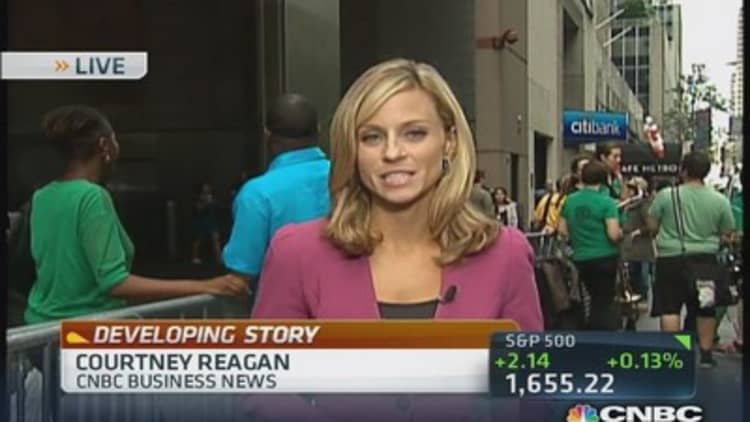New Jersey voters overwhelming approved a ballot measure in Tuesday's off-year election to raise the state's minimum wage to $8.25 an hour on Jan. 1.
Similar results are expected in Washington, where votes are still being counted on a ballot measure to increase the minimum wage for workers around Seattle-Tacoma International Airport to $15 an hour. The latest results show the measure with 54 percent approval.
Washington already has the highest minimum wage in the U.S.: $9.19 an hour.
These two victories are part of the growing trend of minimum wage measures heading into next year's mid-term elections, according to advocates . Similar efforts are underway across the country, from the District of Columbia to South Dakota.
"2014 will be a big year for the minimum wage on state and local ballots," said Tsedeye Gebreselassie, a staff attorney at the National Employment Law Project, which supports hikes. "What happened in New Jersey and Washington are momentum-builders and good news for us."
Meanwhile, people on the other side are in a slight state of shock.
"I'm very surprised they passed," said Tim Nash, an economics professor at Northwood University and an opponent of raising the minimum wage.
"i think there's a general lack of economic understanding, and that if we wave a magic wand and raise wages, the economy will get better," he said.
(Read more: Look at who's the real winner of Tuesday's elections)
New Jersey joins other states
New Jersey's law passed 61 percent to 39 percent. It was fought vigorously by businesses organizations, as well as Republican Gov. Chris Christie, who was re-elected to a second term Tuesday.
Christie vetoed a similar measure passed by the Democratic-led legislature last January.
The governor counteroffered with a dollar-an-hour bump phased in over three years. He also rejected automatic yearly increases, which business groups opposed and which he said would "jeopardize the economic recovery we all seek."
But state Democratic lawmakers turned down Christie's idea and approved placing the minimum wage issue on Tuesday's ballot.
Read more: Op-ed: What the GOP needs to do to win elections again)
Not all business leaders in New Jersey were upset that the bill passed, however.
"Voters have given New Jersey a raise, boosting businesses and workers, and building momentum for overdue state and federal increases," said Holly Sklar, director of Business for a Fair Minimum Wage, in a release Wednesday morning.
The state becomes the fourth to raise its minimum wage this year, following New York, Connecticut and California, which last month approved an increase to $10 an hour.
And on Jan. 1, 19 other states and D.C. will raise their minimum wage above the federal level of $7.25 an hour—all with the approval of most voters and elected officials.

The November 2014 could see states flooded with ballot initiatives to raise the minimum wage.
Signature-gathering campaigns are underway in Massachusetts, South Dakota, Alaska and Idaho to place measures on the ballot that would raise the minimum wage. Legislative proposals are being considered in Maryland, Illinois, Minnesota, Hawaii and the District of Columbia.
States and cities cannot set a minimum wage lower than the federal standard but do have the power to raise it.
There is an effort in Congress to raise the federal minimum wage to $9.80 by next year—it hasn't been raised in seven years. In his state of the union speech in February, President Barack Obama called for Congress to raise it to $9 an hour.
But proponents say that if anything's to be done in Washington, it has to start at the local level.
"I think on almost any big issue, you've seen states and city officials drive Congress and the White House to action," said Gebreselassie at the National Employment Law Project. "So I think this activity for raising the minimum wage by states and cities will eventually put pressure on Washington to do something."
Opponents on the defensive?
Opponents of minimum wage hikes appear to have their work cut out for them.
It looks as if most people are behind the increases, according to a study from Heart Research Associates. It found that 80 percent of Americans—including 62 percent of Republican voters polled—say they support raising the federal minimum wage to $10.10 an hour.
(Read more: Astrodome doomed, Colorado schools go to pot)
"More and more Americans are working these low-paying jobs and understand the issues behind them," said Gebreslassie. "That's why we expect more of the states and cities to raise the minimum wage rates next year and beyond, even with the push-back" from business, she added.
"I hope they don't pass," said Nash at Northwood University. "I'm always amazed how people think about the minimum wage."
"It's not that people are conspiring to keep wages down. Companies are just worried about the future, higher taxes and costs," he said.
—By CNBC's Mark Koba. Follow him on Twitter @MarkKobaCNBC
.

